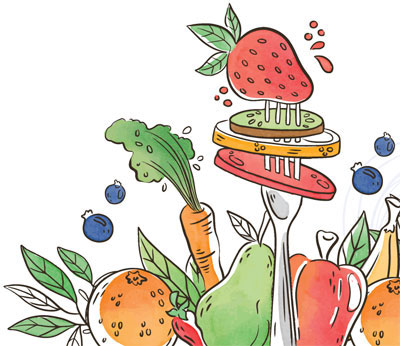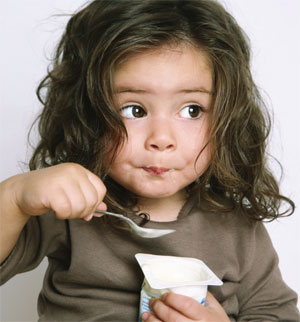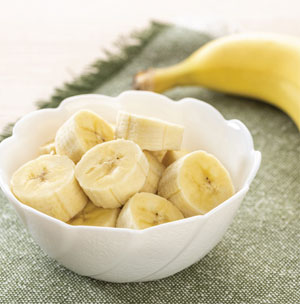Food

Although eating a well-balanced and nutritious diet is important throughout the course of our lives, it is especially critical in early childhood.
During this time, significant brain development occurs. Installing healthy eating habits and providing good nutritional choices is extremely important to ensure normal development in a number of areas including:
Cognitive development brain development, including the ability for children to develop language skills, gain short and long-term memory, and make connections.
Physical development this is the actual physical growth of a child including height and weight.
Emotional and social development the ability for children to mature and form relationships with others.
All three of these types of development benefit from well-balanced nutrition.

“My daughter was so fussy before, but learn to eat so many different foods at nursery. Her lunches are so much better than what I eat! I wish I could stay to eat with her at the nursery, it looks so delicious!”
Balanced Approach
Our perfectly balanced menu aims to give your child the best possible chance to thrive and flourish.
We encourage children to develop a positive attitude to food and healthy lifestyles. This is achieved through adopting a whole nursery approach which encompasses children and staff.
We home-cook all our food from scratch at the nursery and use organic ingredients wherever we can.
For the children and our staff, we prepare 4-course meals with:

- a starter (often soup in winter, often a salad in the summer)
- a main course (with an alternative if required)
- a cheese of the day (sometimes plain yogurt)
- and fruit (occasionally cooked fruit, with no added sugar)
We do not add sugar or salt to our food – as fresh ingredients with herbs should be delicious without salt or sugar. The Early Years are an important time to shape food preferences and habits. Children’s pallets are educated each time they eat, and we try not to habituate them to eating salty foods.
Variety
Over the course of a week, we serve lunches containing:
- a meat dish
- a white fish dish
- an oily fish dish
- usually two vegetarian meals
We try to introduce a wide-variety of ingredients and flavours to the children at school, so that they can grow up being healthy and feeling positive about trying new foods. Our approach aims to educate children’s pallets to discover and appreciate a wide range of flavours.
We encourage (but do not force) the children to eat and to taste the food we offer. Children may need to be exposed to a new flavour multiple times before they are familiar with it and confident enough to eat it –which is why tasting is so important (even if a child spits it out, or just puts their tongue on it without actually eating it). We believe this is a process that children can learn with encouragement. For this to be successful, it is vital children feel positive about food – so we never criticise children’s eating, and we know the importance of positive role modelling with regards to eating and tasting.
We aim not to repeat a main course during a two-month period, to set the expectation of food constantly being different – this helps avoid children having “favourite” foods which they will only eat, as they come to expect that food is going to be varied. This variation does not mean we will not repeat an ingredient. Chicken can be roasted, or have a cream sauce, or be served in a Spanish style sauce with tomatoes – this is the variation we are aiming for.
Allergies & Dietary Requirements
We explain to children that tastes change, and that even if they do not like something today, they may like it next time, and that as they get bigger, they will enjoy more flavours. We aim to use seasonal fruits & vegetables, although to be able to meet our aim of variations, this is not always possible. Seasonal produce tends to be available from local sources, so is fresher, tastier and travels less – all making our menu more nutritional and helping us to do our bit for sustainability too.

Some children will have a religious or vegetarian diet. We do not serve pork, and we have a vegetarian alternative every day if requested by the parents.
Some children have allergies, and we can cater for most allergies. We do not allow nuts in the nursery. However, multiple complex allergy combinations might not be feasible for us to cater for (ask for more details).
If you have a medical plan or any doctor’s information, please pass it on to us. We will ask you if your child has any special dietary requirements or food allergies during the settling-in process.
We do not believe it is in a child’s best interest to reduce food variety without a good reason. For instance, we would not be prepared to serve a child a carbohydrate-free diet without a medical reason. Equally, we would not be prepared to serve “only white food”, or to serve a picky eater different food than the other children. We are proud of the quality and variety of the food we serve, and ask parents not to bring in food from home. Of course, when there is a valid reason it is important for us to support a child’s needs. Nevertheless, we aim to have an inclusive an approach where all the children eat the same food as much as possible. Please see our section on fussy eaters at the end of this booklet.
Our approach to serving varied food has been very successful with the children who attend our nursery, even those children who are hesitant to try new foods at home.
Real crockery
We switched away from using plastic plates and cups in 2015. Since then, we have used real plates and glasses. This allows the children to have an experience which is rooted in the real world. At home and in restaurants children see crockery being used, and so it is frustrating for them not to be able to do the same.

We explain to children that we look after the materials in the nursery and that this applies to plates as well. We teach the older children how to carry a plate and how to scrape left-over food into a bowl at the end of a meal, and put their dirty plate into another bowl.
If a child breaks a plate, we offer reassurance to them. We explain things can break and teach older children how to sweep up afterwards. This sense of responsibility and independence is very reassuring for children, and teaches them skills which are helpful all day long.
Social experience & skills
Lunches should be a social experience where children are relaxed and can enjoy their food as well as developing their social skills of sitting together with their peers and teachers.
We ask the children to wait until everyone on their table has food before starting eating. This teaches the skill of awareness of others, and also is an important practice in waiting for something. This waiting skill is a key development in a child’s ability to self-regulate their own emotions.
As a child develops their fine and gross motor skills, we will encourage him/her to serve themselves from a larger food bowl. This is a good exercise in dexterity as well as promoting independence.

Multi-cultural
This is important to us because it introduces more varieties of food, and also recognises and values food from a variety of different cultures. This helps promote tolerance and respect as well as developing their curiosity.
In keeping with our approach of educating children’s pallets to discover and appreciate a wide range of flavours, we incorporate a multinational approach to menu planning.

Morning snack
We do not serve breakfast as we encourage the children to have breakfast at home before coming to nursery. We believe it is important for a child to have breakfast with
their primary carer or family, as it is emotionally stabilising for them, especially if breakfast is eaten at a gentle pace in a positive atmosphere. This helps children start the day well, which helps support them through-out the day.
We serve a mid-morning snack at nursery, where the children can help themselves to food from the tray as they wish. We do not log how much food they eat, although we do supervise this to ensure the children take reasonable portion sizes. They also have access to their own water bottles all day long.

Tea-time
Just to clarify, tea-time does not include the hot drink of tea! At 4pm every day we serve the children some food. This is not a replacement for dinner, but a simple snack when the children sit together. Some days we serve savoury food, other days we might include something sweet, such as a natural home-made fruit smoothie. We serve milk and water as well. To be honest, our afternoon teas have much less variety than the lunches.
Information and Feedback
For young children, we aim to give parents daily feedback of the food their children have eaten. We use daily food charts which usually give an indication of the amount eaten. For children in the Lions classroom, we no longer give feedback unless the child has not eaten. We expect the older children to be enjoying their food every day, and follow the “no news is good news” approach for them in communicating with you.

Birthdays
When celebrating birthdays, children will be allowed to bring their birthday cake to the nursery. We will blow the candles and sing the birthday song together. The cake will then be cut in slices, wrapped in foil and given to parents/carers when child are being collected to go home.
We ask the parents who bring in birthday cake to ensure we have a list of ingredients, so we inform all the parents/carers of the allergens in the birthday cake. Please remember not to bring a cake which contains nuts! We also ask you to bring in healthy cakes, avoiding cakes which are really covered in icing please.
The fussiest eaters
Over the years, parents of very picky eaters have asked us for advice. We worked with a nutritionist, who gave us guidelines for food at home.
It is helpful if the nursery and home use a similar food strategy of varied food.
If a child refuses to eat anything except their favourite food, then a plate/meal can include it sometimes, but other food should also be included to provide a balanced meal that contains all of the food groups: fat, carbohydrate, vegetables and protein. If a child only eats one of the items of the groups, that is fine – however, he or she should not be given seconds of that food unless they have tried some of the other foods available. So, a child who only eats bread, can be given bread with the meal, but should not be given so much bread that
they are full just on the bread.
If a child is hungry at the end of the meal, that’s OK. It is not dangerous for them, and then at the next meal s/he will be very hungry and more likely to eat more food types – when a person is hungry, all food seems more appealing.
We have been impressed by the services of Francine at Diet Consulting. If parents would like futher support from a private bilingual nutritionist or dietician, we are happy to recommend her services. www.dietconsulting.co.uk
And Finally
It is a loving act to help children eat a variety of food. With love and tenderness, we can explain why it is important to eat a varied diet. We want to emotionally support children as they try new foods throughout their learning journey in early years of their life. Providing opportunities to encourage children to eat well and learn about food, not only helps protect their health while young but also sets the foundations for their future health and wellbeing.







